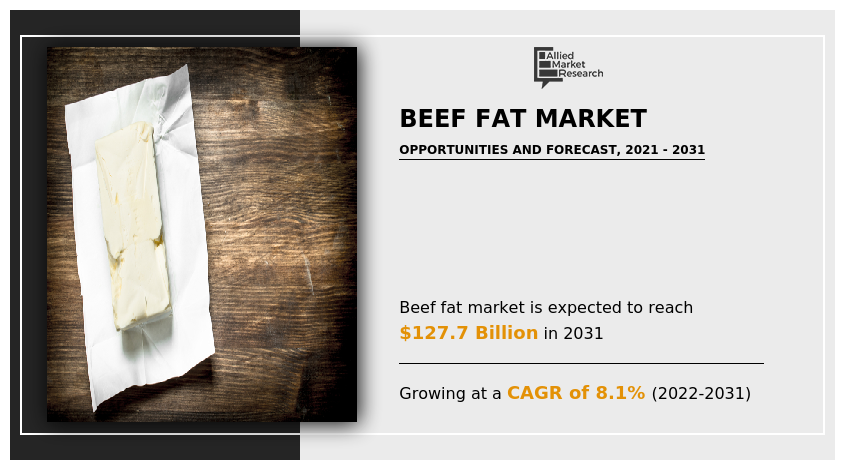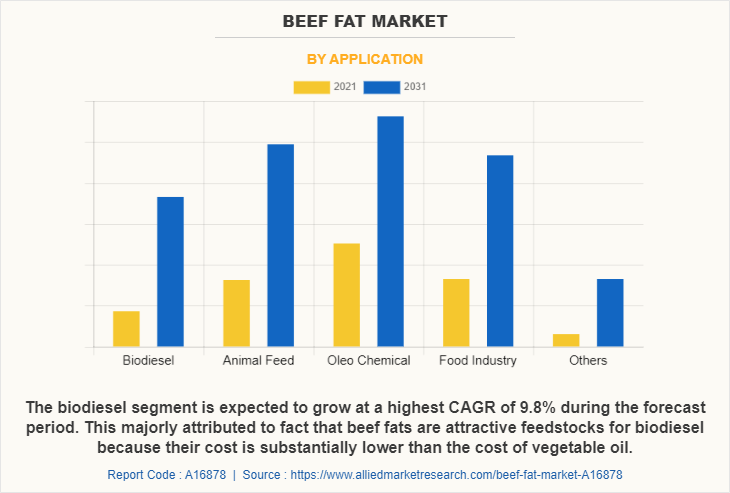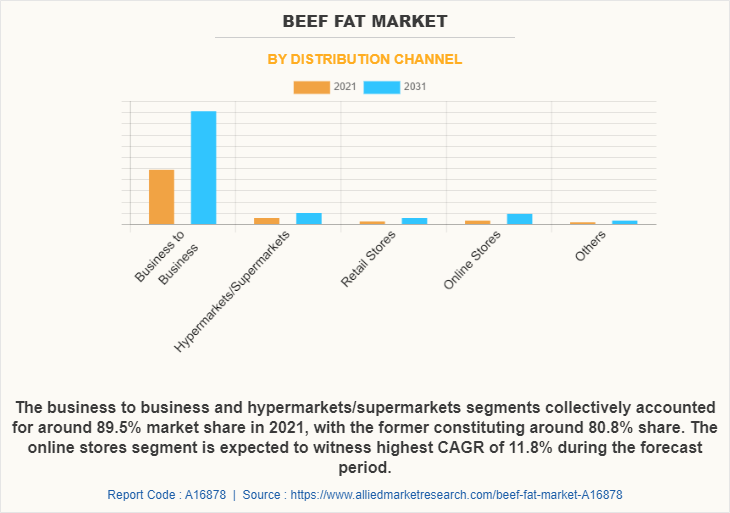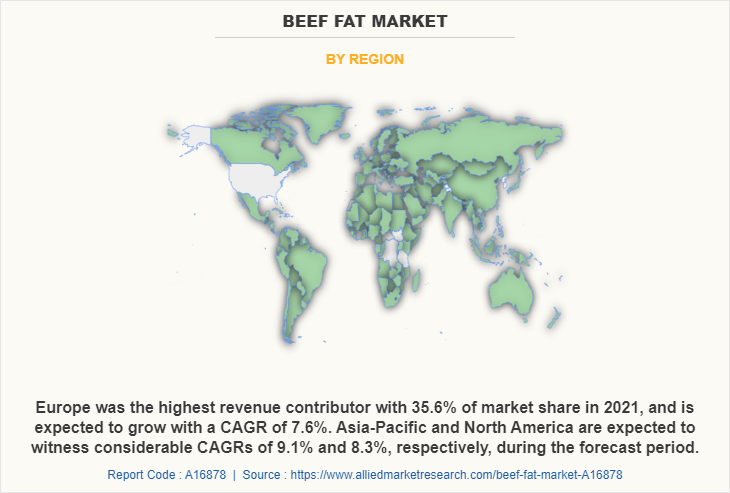The global beef fat market was valued at $59.8 billion in 2021, and is projected to reach $127.7 billion by 2031, growing at a CAGR of 8.1% from 2022 to 2031.
Beef is mostly composed of triglycerides, which are converted into beef fat. Additionally, it is used in numerous industries including Biodiesel, Animal Feed, Oleo Chemical, Food Industry and Others. Beef fat has great stability that it can be kept at room temperature for an extended period of time without the use of a refrigerator. Due to its extensive applications across numerous end use industries such as biodiesel, animal feed, oleo chemicals, and the food industry, beef fat has been gaining significant traction in the global market. Additionally, there is emerging awareness of the health benefits of beef fat, including its ability to strengthen the immune system, lower inflammation, offer healthy fat, and encourage fat burning. Additionally, since beef fat has antibacterial characteristics, it is used in personal care products to protect the body from infection.
The demand for beef fat has increased especially in emerging economies like China and India, where there has been an increase in per capita income, per capita consumption of animal fat, and the need for energy-dense, high-fat diets. Additionally, the rapid growth of the food & beverage and food services industries is likely to supplement the growth of animal fat including beef fat as beef fat improves the taste and texture of food and is also used in cooking.
Beef fat market revenue is anticipated to increase at a high CAGR, driven by millennials' phenomenal demand and demand from emerging regions. Key growth drivers in the beef fat market are technological advancements that allow for successful manufacturing, an expanded product line, smart design and packaging, efficient operational maintenance, and sales monitoring.
Animal fats including beef fat provide calories and essential fats as well as aid in the absorption of fat-soluble vitamins, such as A, D, E, and K. However, overconsumption of unhealthy fats, such as saturated and trans fats, increases low-density lipoprotein (LDL) cholesterol while decreasing healthy high-density lipoprotein (HDL) cholesterol. This imbalance increases the risk of high blood pressure, artery hardening (atherosclerosis), heart attack, and stroke. Thus, an increase in the prevalence of health problems as a result of excessive fat consumption hampers the growth of the global beef fat market size.

The beef fat market is segmented into application, distribution channel, and region. On the basis of application, the market is categorized into biodiesel, animal feed, oleo chemical, food industry, and others. By distribution channel, it is segmented into business-to-business, hypermarkets/supermarkets, retail stores, online stores, and others. On the basis of region, it is analyzed across North America (the U.S., Canada, and Mexico), Europe (Germany, Belgium, France, UK, Italy, Spain and Rest Of Europe), Asia-Pacific (China, Japan, India, South Korea, Australia, New Zealand and Rest Of Asia-Pacific), and LAMEA (Brazil, South Africa, Saudi Arabia and Rest Of LAMEA).
On the basis of application, the oleo chemical segment was the highest contributor to the market, with $17,500.5 million in 2021, and is estimated to reach $33,135.9 million by 2031, at a CAGR of 6.9% during the forecast period. Inedible beef fat serves as a significant raw material in the manufacturing of fatty acids, which in turn helps to create oleochemicals. American-rendered beef fat typically makes up the majority of the blend used to create inedible tallow and grease. Increasing use of the beef fat for the production of oleo chemicals is significantly supplemented the beef fat market growth. Rising consumption of renewable, sustainable, and bio-based chemicals in personal care & cosmetics, food & beverages, pharmaceuticals, and other industries is anticipated to generate demand for oleo chemicals which in turn boost the growth of the beef fat market.

According to the distribution channel, the hypermarkets/supermarkets segment was the significant contributor to the market, with $5,229.0 million in 2021, and is expected to grow at a CAGR of 6.7% during the forecast period. Supermarket/hypermarket is gaining considerable popularity due to the availability of a broad range of food products including beef fat under a single roof, in addition to ample parking space and convenient operation timings. Moreover, products are arranged nearby, which aids buyers in easy comparison among similar products, thereby helping consumers to decide which product to buy. In addition, an increase in urbanization, a rise in the working-class population, and competitive pricing boost the popularity of supermarkets/hypermarkets.

Region-wise, Europe garnered the highest beef fat market share in 2021 and is expected to maintain its market share throughout the beef fat market forecast period. An increase in awareness of the health benefits of sustainable animal fat, including beef, is expected to boost its consumption across Europe. Beef fat contains saturated fat and calories, which is considered a vital nutrient that aids to improve the immune system. Furthermore, as compared to vegetable oils, animal fat has a much lower carbon footprint. As a result, an increase in animal fat adoption is expected to contribute to the growth of the Europe beef fat market in the coming years.

The players operating in the global beef fat industry have adopted various developmental strategies to expand their market share, increase profitability, and remain competitive in the market. The key players profiled in this report Windsor Quality Meats, Tassie Tallow, Wellness Beefs, Indian Feeds Company, Pridham Pty Ltd, SBH Foods, Mercomeat, PIERMEN B.V., Devra Trading Ltd., and Darling Ingredients, Inc.
Key Benefits For Stakeholders
- This report provides a quantitative analysis of the market segments, current trends, estimations, and dynamics of the beef fat market analysis from 2021 to 2031 to identify the prevailing beef fat market opportunities.
- Market research is offered along with information related to key drivers, restraints, and opportunities.
- Porter's five forces analysis highlights the potency of buyers and suppliers to enable stakeholders make profit-oriented business decisions and strengthen their supplier-buyer network.
- An in-depth analysis of the beef fat market segmentation assists to determine the prevailing market opportunities.
- Major countries in each region are mapped according to their revenue contribution to the global market.
- Market player positioning facilitates benchmarking and provides a clear understanding of the present position of the market players.
- The report includes the analysis of the regional as well as global beef fat market trends, key players, market segments, application areas, and market growth strategies.
Beef fat Market Report Highlights
| Aspects | Details |
| Market Size By 2031 | USD 127.7 billion |
| Growth Rate | CAGR of 8.1% |
| Forecast period | 2021 - 2031 |
| Report Pages | 228 |
| By Application |
|
| By Distribution Channel |
|
| By Region |
|
| Key Market Players | Devra Trading Ltd, Pridham Pty Ltd, PIERMEN B.V., Windsor Quality Meats, Tassie Tallow, SBH Foods, Indian Feeds Company, Darling Ingredients, Inc., Mercomeat, Wellness Beefs |
Analyst Review
Insights from CXOs of top firms indicate that the market for beef fat has been growing steadily over the past few years. In addition, one of the main driving reasons is the rise in demand for animal fats in the food & beverages business. Shortening, margarine, and compound fat are typically made with animal fats. They can also be found in a lot of processed foods. Beef fats are employed in the production of lubricants, soaps, fatty acids, and feeds. The market is driven by demand from nations, mainly from China, and India. The various food industries of these nations, which are supported by rising living standards and population expansion, drive the need for beef fat. The demand for beef fat is driven by increased emphasis on biofuels, such as biodiesel generated from animal fats, including beef fat. The global market's expansion is, however, being constrained by health issues related to fats. For example, excessive consumption of beef fats raises the risk of thrombosis.
The global beef fat market was valued at $59.8 billion in 2021, and is projected to reach $127.7 billion by 2031
The global Beef fat market is projected to grow at a compound annual growth rate of 8.1% from 2022 to 2031 $127.7 billion by 2031
The key players profiled in this report Windsor Quality Meats, Tassie Tallow, Wellness Beefs, Indian Feeds Company, Pridham Pty Ltd, SBH Foods, Mercomeat, PIERMEN B.V., Devra Trading Ltd., and Darling Ingredients, Inc.
Region-wise, Europe garnered the highest beef fat market share in 2021
Rise in per capita income and increase in consumption of animal fats., Surge in need for energy-dense and high-fat diets.
Loading Table Of Content...



